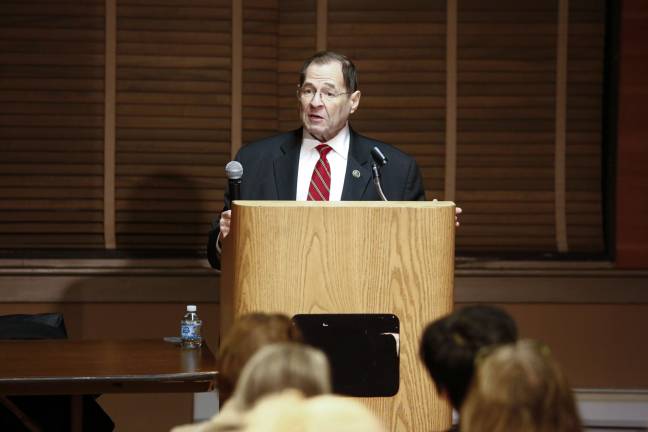live from Washington: Jerrold nadler

The wall President Trump wants to build along the Mexican border is a “4th century solution to a 21st century problem” Democratic Congressman Jerrold Nadler told his Upper West Side consituents on Wednesday. “The president is holding the American people hostage,” said Nadler, the new head of the Judiciary Committee. “There is no crisis at the border and the president keeps scaring people ... It’s purely political.”
Nadler’s comments came as he kept his promise to meet with the people of the 10th congressional district, albeit remotely. The Goddard Riverside Community Center has hosted a Town Hall meeting with Nadler every year since he took office in 1992. But thanks to the packed schedule that comes with his powerful new role in the Democratic-controlled House of Representatives, for the first time ever the event had to be livestreamed instead of in-person.
Larry Wood has coordinated the annual forum for decades. This year’s attendees were asked to write their concerns down, and Wood asked the congressman questions. The mood of the crowd was typified by Adrienne Gorman of the Upper West Side. “We have a president who is out of control,” Gorman said. “He wants to take us out of NATO. [He] didn’t ask permission of Congress, which has oversight function ... I want to ask Congressman Nadler what he intends to do about this. Nadler’s a good guy, but we need to know.”
Nadler, as usual, made his positions clear with the kind of straight talk New Yorkers have come to expect from him. “The instance of crimes committed by immigrants, legal or illegal, is substantially lower per capita than the instance of crimes of people born right here,” he pointed out. As for drugs, he added, they often come across the border in trucks, and a wall wouldn’t stop that. What’s needed, he said, is better technology, more Coast Guard cutters and more immigration judges. Trump has proposed more detainment camps, a more costly and inhumane solution, but what’s really needed is more judges, Nadler said.
As for questions about Trump’s truthfulness, “Polls show no one believes what he says,” said Nadler.
There is a plethora of issues for the Democratic majority in the House to address, Nadler explained, including the Mueller investigation, gun control, voter suppression, the 2020 census, climate change, tax policy and much, much more.
As chair of the powerful Judiciary Committee, Nadler’s purview includes the Mueller investigation and the web of issues and individuals touched by the special counsel’s ongoing examination of possible foreign interference in the 2016 presidential election. “We will use the subpoena power,” said Nadler, when it comes to President Trump’s former personal attorney, Michael Cohen. “We expect hearings to be open, public and hard hitting.” And should the Trump administration refuse to make the Mueller report public when it’s finally finished, “We can challenge [acting Attorney General Matthew] Whitaker with a subpoena.”
As for gun violence, Nadler noted that there is gun legislation that’s been held captive by the NRA for decades. “It’s slanderous to say Americans are many more times mentally ill than the rest of the world,” Nadler said, referring to the common tactic of gun rights proponents to blame mass shootings on deranged individuals rather than the ready availability of weapons. Statistics show that the gun violence per capita is dramatically higher in the United States than any other country, he said.
Nadler called the growing gap between the popular vote and the Electoral College “a dramatic failure of democracy,” In 2000, 500,000 more people voted for Al Gore than George W. Bush, and in 2016, Hillary Clinton nabbed 2.8 million more votes than Donald Trump. To avoid such outcomes in the future, Nadler backs the Popular Vote Initiative, which guarantees the election of the presidential candidate who receives the most popular votes. The initiative involves the passage of state statutes that award electoral votes to the winner of the national popular vote. The initiative would take effect once the participating states together hold a majority of electoral votes (270 of 538).
Nadler sees the Trump administration’s push to add a citizenship question to the 2020 census, which he says could suppress the count by 5 to 7 percent, as a threat to billions of dollars in federal support for essential state and city services, including transportation. A faulty census count could also lead to decreases in congressional representation and politically-charged changes in the boundaries of congressional districts. The Trump administration is currently asking the Supreme Court to review a recent U.S. Disrict Court decision that spiked the question.
Naturally, taxes were a hot topic, specifically the cap on the state and local tax (SALT) deduction, part of the Trump tax plan approved last year, which could hammer many Upper West Siders now that tax time is upon us. Nadler explained how people who live in states that provide more health care and other social services to their citizens, and have higher taxes as a result, are basically penalized by the SALT cap, which effectively increases federal tax bills. The higher tax bills can then lead to an erosion of support for vital state services.
Of course, Nadler knows the Republican-controlled Senate is the boulder in the road for the House Democrats’ efforts. “In general, there’s a limited amount that we can do,” he acknowledged. “But we can advance legislation to tee up for passage.” With the 2020 elections already rumbling to life, and a Democratic-controlled Senate and White House among the possible outcomes, even a savvy political veteran like Jerrold Nadler can dream, can’t he?